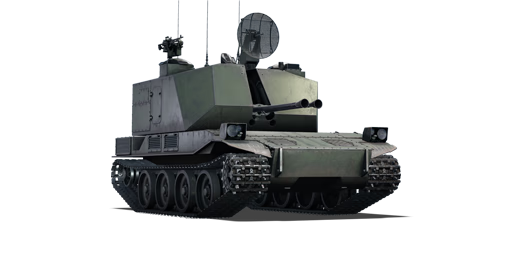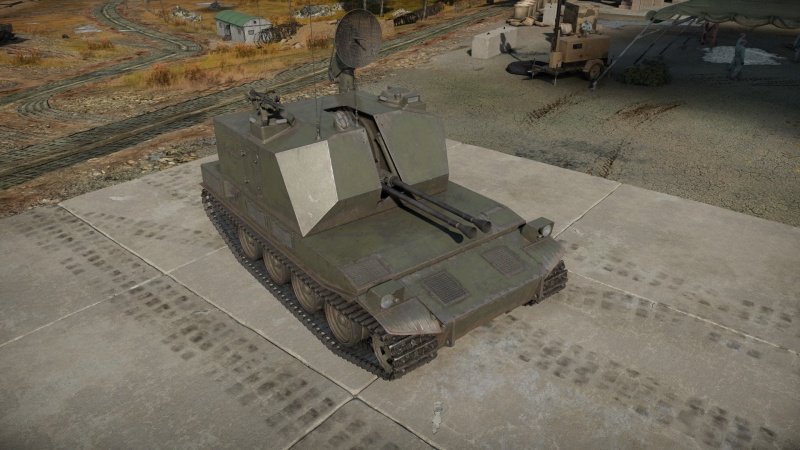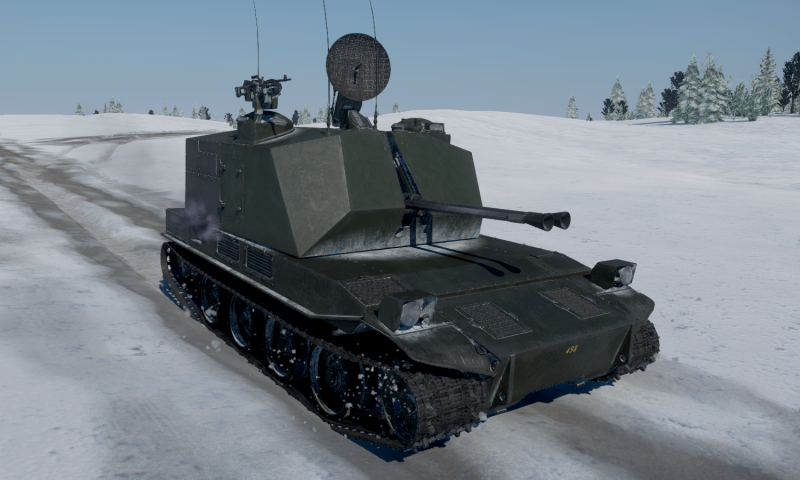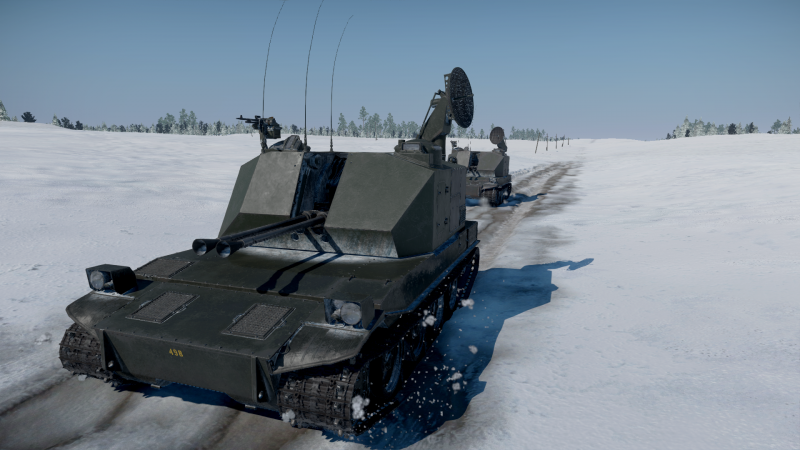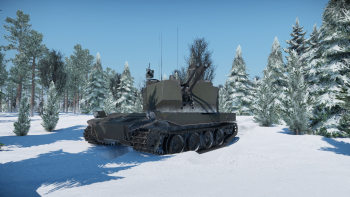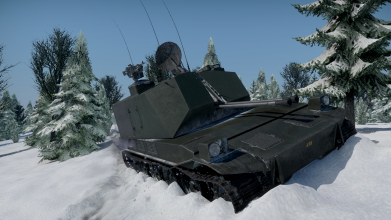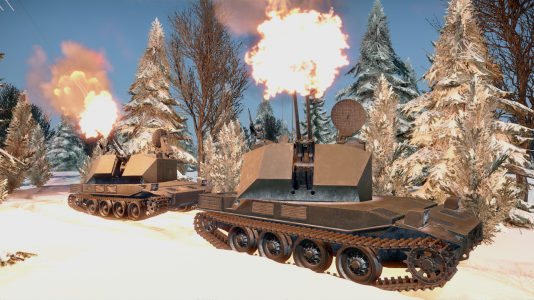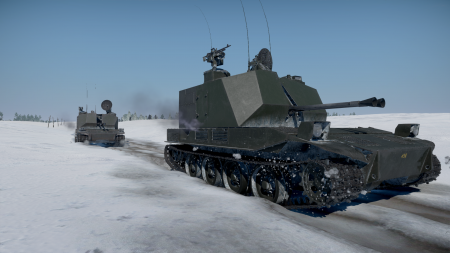Difference between revisions of "VEAK 40"
(added more images) |
(Edits) |
||
| Line 1: | Line 1: | ||
{{Specs-Card | {{Specs-Card | ||
|code=sw_veak_40 | |code=sw_veak_40 | ||
| − | |images={{Specs-Card-Image|VEAK 40 main.png| | + | |images={{Specs-Card-Image|GarageImage_{{PAGENAME}}.jpg|VEAK 40 main.png|VEAK 40 driving 3.png}} |
}} | }} | ||
== Description == | == Description == | ||
<!-- ''In the description, the first part should be about the history of the creation and combat usage of the vehicle, as well as its key features. In the second part, tell the reader about the ground vehicle in the game. Insert a screenshot of the vehicle, so that if the novice player does not remember the vehicle by name, he will immediately understand what kind of vehicle the article is talking about.'' --> | <!-- ''In the description, the first part should be about the history of the creation and combat usage of the vehicle, as well as its key features. In the second part, tell the reader about the ground vehicle in the game. Insert a screenshot of the vehicle, so that if the novice player does not remember the vehicle by name, he will immediately understand what kind of vehicle the article is talking about.'' --> | ||
| − | '''{{Specs|name}}''' (English: ''Wagon Fire-control AutoCannon 40''), or '''{{PAGENAME}}''' for short, is a rank {{Specs|rank}} Swedish | + | The '''{{Specs|name}}''' (English: ''Wagon Fire-control AutoCannon 40''), or '''{{PAGENAME}}''' for short, is a rank {{Specs|rank}} Swedish self-propelled anti-aircraft vehicle {{Battle-rating}}. It was introduced in [[Update 1.97 "Viking Fury"]]. The name {{PAGENAME}} follows Bofors naming scheme, not the Swedish army's naming scheme. Its full historical Bofors-name was '''Bofors VEAK 40 X 60''', VEAK indicating type (tracked vehicle with FC-radar and autocannons), 40 indicating calibre (40 mm) and 60 indicating year of design (1960). |
[[File:VEAK 40 vinter.png|350px|thumb|left|'''{{PAGENAME}}''' keeping the skies clear over Northern Europe.]] | [[File:VEAK 40 vinter.png|350px|thumb|left|'''{{PAGENAME}}''' keeping the skies clear over Northern Europe.]] | ||
| − | The {{PAGENAME}} was developed by the Swedish arms manufacturer Bofors | + | The {{PAGENAME}} was developed by the Swedish arms manufacturer Bofors by request of the Swedish army as a 1960s next generation Swedish SPAA following the 1940s limited production Lvkv fm/43 SPAA and failed 1950s [[Lvkv 42]] prototype SPAA. A single prototype based on the Strv 103 chassis was built and delivered for testing in 1964. The project was delayed at this point but testing commenced and the vehicle proved to be ahead of its time regarding armament and fire control system. This however made the vehicle too costly and in the end the project had to be scrapped due to resources going to the Swedish air force rather than the Swedish air defense. |
| − | The {{PAGENAME}} is armed with two 40 mm Bofors L/70 autocannons (Swedish designation: [[lvakan m/48 (40 mm)|40 mm lvakan m/48]]) which each have a fire rate of 300 rounds per minute and are capable of firing proximity | + | The {{PAGENAME}} is armed with two 40 mm Bofors L/70 autocannons (Swedish designation: [[lvakan m/48 (40 mm)|40 mm lvakan m/48]]) which each have a fire rate of 300 rounds per minute and are capable of firing proximity-fused high explosive shells which will airburst and damage aircraft when reaching their vicinity. It has mediocre mobility and subpar protection but does feature excellent vertical and horizontal traverse speed for the guns. It also comes equipped with a tracking and search radar that allows the player to find and track airborne targets within a 12 km radius. |
== General info == | == General info == | ||
| Line 17: | Line 17: | ||
{{Specs-Tank-Armour}} | {{Specs-Tank-Armour}} | ||
<!-- ''Describe armour protection. Note the most well protected and key weak areas. Appreciate the layout of modules as well as the number and location of crew members. Is the level of armour protection sufficient, is the placement of modules helpful for survival in combat? If necessary use a visual template to indicate the most secure and weak zones of the armour.'' --> | <!-- ''Describe armour protection. Note the most well protected and key weak areas. Appreciate the layout of modules as well as the number and location of crew members. Is the level of armour protection sufficient, is the placement of modules helpful for survival in combat? If necessary use a visual template to indicate the most secure and weak zones of the armour.'' --> | ||
| − | The armour of the {{PAGENAME}} is | + | The armour of the {{PAGENAME}} is roughly 15 mm thick all around with very limited sloping angles to back it up. Thus even heavy machine guns can knock it out from all directions. The turret is very big and boxy and also houses all of the vehicles ammunition and crew. Thus a shot to the turret usually results in an ammo rack detonation. The hull however is fairly empty of components and only houses the transmission and engine. The engine and transmission are also located in their own compartment which results in tons of empty space in the hull. Thus a shot to the hull usually leaves the vehicle combat capable. |
| − | '''Armour | + | '''Armour type:''' |
| − | |||
| − | |||
* Rolled homogeneous armour | * Rolled homogeneous armour | ||
* Cast homogeneous armour (Cupolas) | * Cast homogeneous armour (Cupolas) | ||
| Line 38: | Line 36: | ||
|} | |} | ||
| − | '''Notes:''' | + | '''Notes:''' |
| − | |||
* Suspension wheels, tracks and torsion bars are 20 mm thick. | * Suspension wheels, tracks and torsion bars are 20 mm thick. | ||
=== Mobility === | === Mobility === | ||
| − | [[File: | + | [[File:VEAK 40 driving 1.png|thumb|left|x220px|The '''{{PAGENAME}}''' moving through though thick snow.]] |
{{Specs-Tank-Mobility}} | {{Specs-Tank-Mobility}} | ||
<!-- ''Write about the mobility of the ground vehicle. Estimate the specific power and manoeuvrability, as well as the maximum speed forwards and backwards.'' --> | <!-- ''Write about the mobility of the ground vehicle. Estimate the specific power and manoeuvrability, as well as the maximum speed forwards and backwards.'' --> | ||
| + | |||
{{tankMobility|abMinHp=767|rbMinHp=478}} | {{tankMobility|abMinHp=767|rbMinHp=478}} | ||
| Line 54: | Line 52: | ||
{{Specs-Tank-Armaments}} | {{Specs-Tank-Armaments}} | ||
=== Main armament === | === Main armament === | ||
| − | [[File: | + | [[File:VEAK 40 firing.png|thumb|right|x300px|Two '''{{PAGENAME}}''' combating air targets.]] |
{{Specs-Tank-Weapon|1}} | {{Specs-Tank-Weapon|1}} | ||
<!-- ''Give the reader information about the characteristics of the main gun. Assess its effectiveness in a battle based on the reloading speed, ballistics and the power of shells. Do not forget about the flexibility of the fire, that is how quickly the cannon can be aimed at the target, open fire on it and aim at another enemy. Add a link to the main article on the gun: <code><nowiki>{{main|Name of the weapon}}</nowiki></code>. Describe in general terms the ammunition available for the main gun. Give advice on how to use them and how to fill the ammunition storage.'' --> | <!-- ''Give the reader information about the characteristics of the main gun. Assess its effectiveness in a battle based on the reloading speed, ballistics and the power of shells. Do not forget about the flexibility of the fire, that is how quickly the cannon can be aimed at the target, open fire on it and aim at another enemy. Add a link to the main article on the gun: <code><nowiki>{{main|Name of the weapon}}</nowiki></code>. Describe in general terms the ammunition available for the main gun. Give advice on how to use them and how to fill the ammunition storage.'' --> | ||
| Line 130: | Line 128: | ||
== Usage in battles == | == Usage in battles == | ||
| − | [[File: | + | [[File:VEAK 40 driving 2.png|thumb|right|450px|Two '''{{PAGENAME}}''' driving in a convoy.]] |
''Describe the tactics of playing in the vehicle, the features of using vehicles in the team and advice on tactics. Refrain from creating a "guide" - do not impose a single point of view but instead give the reader food for thought. Describe the most dangerous enemies and give recommendations on fighting them. If necessary, note the specifics of the game in different modes (AB, RB, SB).'' | ''Describe the tactics of playing in the vehicle, the features of using vehicles in the team and advice on tactics. Refrain from creating a "guide" - do not impose a single point of view but instead give the reader food for thought. Describe the most dangerous enemies and give recommendations on fighting them. If necessary, note the specifics of the game in different modes (AB, RB, SB).'' | ||
Revision as of 19:35, 9 July 2021
Contents
Description
The Vagn Eldledning AutomatKanon 40 (English: Wagon Fire-control AutoCannon 40), or VEAK 40 for short, is a rank V Swedish self-propelled anti-aircraft vehicle with a battle rating of 7.7 (AB/RB/SB). It was introduced in Update 1.97 "Viking Fury". The name VEAK 40 follows Bofors naming scheme, not the Swedish army's naming scheme. Its full historical Bofors-name was Bofors VEAK 40 X 60, VEAK indicating type (tracked vehicle with FC-radar and autocannons), 40 indicating calibre (40 mm) and 60 indicating year of design (1960).
The VEAK 40 was developed by the Swedish arms manufacturer Bofors by request of the Swedish army as a 1960s next generation Swedish SPAA following the 1940s limited production Lvkv fm/43 SPAA and failed 1950s Lvkv 42 prototype SPAA. A single prototype based on the Strv 103 chassis was built and delivered for testing in 1964. The project was delayed at this point but testing commenced and the vehicle proved to be ahead of its time regarding armament and fire control system. This however made the vehicle too costly and in the end the project had to be scrapped due to resources going to the Swedish air force rather than the Swedish air defense.
The VEAK 40 is armed with two 40 mm Bofors L/70 autocannons (Swedish designation: 40 mm lvakan m/48) which each have a fire rate of 300 rounds per minute and are capable of firing proximity-fused high explosive shells which will airburst and damage aircraft when reaching their vicinity. It has mediocre mobility and subpar protection but does feature excellent vertical and horizontal traverse speed for the guns. It also comes equipped with a tracking and search radar that allows the player to find and track airborne targets within a 12 km radius.
General info
Survivability and armour
The armour of the VEAK 40 is roughly 15 mm thick all around with very limited sloping angles to back it up. Thus even heavy machine guns can knock it out from all directions. The turret is very big and boxy and also houses all of the vehicles ammunition and crew. Thus a shot to the turret usually results in an ammo rack detonation. The hull however is fairly empty of components and only houses the transmission and engine. The engine and transmission are also located in their own compartment which results in tons of empty space in the hull. Thus a shot to the hull usually leaves the vehicle combat capable.
Armour type:
- Rolled homogeneous armour
- Cast homogeneous armour (Cupolas)
- Structural steel (Radar mast, Radar dish, Mud skirts, Suspension)
| Armour | Front (Slope°) | Sides [Internal] (Slope°) | Rear (Slope°) | Roof (Slope°) |
|---|---|---|---|---|
| Hull | 5-15 mm (77°) Front glacis 15 mm (18-71°) Lower glasis |
5-15 mm [+5 mm] (0°) Upper sides 15 mm (0°) Lower sides |
15 mm (0°) Upper rear 15 mm (13°) Lower rear |
15 mm (90°) Roof 4 mm (29-77°) Mud skirts |
| Turret | 15 mm (25°) Upper right sheek 15 mm (0°) Upper left sheek 15 mm (26°) Upper right front 15 mm (41°) Upper left front 15 mm (17°) Lower front |
5 mm (74°) Upper sides 15 mm (0°) Forward sides 5 mm (0°) Backward sides |
5 mm (73°) Upper rear 5 mm (0°) Lower rear |
5 mm (0°) Roof 15 mm (0-35°) Radar mast 15 mm (0-68°) Radar dish |
| Cupola | 15 mm (0°) | 15 mm (0°) | 15 mm (0°) | 15 mm (44-83°) Cupola dome |
Notes:
- Suspension wheels, tracks and torsion bars are 20 mm thick.
Mobility
| Game Mode | Max Speed (km/h) | Weight (tons) | Engine power (horsepower) | Power-to-weight ratio (hp/ton) | |||
|---|---|---|---|---|---|---|---|
| Forward | Reverse | Stock | Upgraded | Stock | Upgraded | ||
| Arcade | 66 | 21 | 29 | 767 | 1,030 | 26.45 | 35.52 |
| Realistic | 61 | 19 | 478 | 540 | 16.48 | 18.62 | |
Modifications and economy
Armaments
Main armament
| 40 mm lvakan m/48 (x2) | Turret rotation speed (°/s) | Reloading rate (seconds) | ||||||||||||
|---|---|---|---|---|---|---|---|---|---|---|---|---|---|---|
| Mode | Capacity (Belt) | Fire rate | Vertical | Horizontal | Stabilizer | Stock | Upgraded | Full | Expert | Aced | Stock | Full | Expert | Aced |
| Arcade | 420 (10) | 300 | -5°/+85° | ±180° | Two-plane | 74.9 | 103.6 | 125.8 | 139.1 | 148.0 | 0.65 | 0.58 | 0.53 | 0.50 |
| Realistic | 50.6 | 59.5 | 72.2 | 79.9 | 85.0 | |||||||||
Ammunition
- Default: SAPHEI · HEFI-T
- slsgr m/484: HE-VT* · HE-VT* · HE-VT*
- slpprj m/42B: AP · AP · AP · HEFI-T
| Penetration statistics | ||||||
|---|---|---|---|---|---|---|
| Belt | Penetration @ 0° Angle of Attack (mm) | |||||
| 10 m | 100 m | 500 m | 1,000 m | 1,500 m | 2,000 m | |
| Default | 66 | 62 | 48 | 34 | 25 | 18 |
| slsgr m/484 | 4 | 4 | 4 | 4 | 4 | 4 |
| slpprj m/42B | 95 | 90 | 72 | 55 | 42 | 32 |
Ammo racks
| Full ammo |
1st rack empty |
2nd rack empty |
3rd rack empty |
4th rack empty |
5th rack empty |
6th rack empty |
Visual discrepancy |
|---|---|---|---|---|---|---|---|
| 42 | __ (+__) | __ (+__) | __ (+__) | __ (+__) | __ (+__) | __ (+__) | __ |
Machine guns
| 7.62 mm ksp 58 | ||||
|---|---|---|---|---|
| Mount | Capacity (Belt) | Fire rate | Vertical | Horizontal |
| Pintle | 1,000 (250) | 600 | -10°/+50° | ±120° |
Usage in battles
Describe the tactics of playing in the vehicle, the features of using vehicles in the team and advice on tactics. Refrain from creating a "guide" - do not impose a single point of view but instead give the reader food for thought. Describe the most dangerous enemies and give recommendations on fighting them. If necessary, note the specifics of the game in different modes (AB, RB, SB).
Pros and cons
Pros:
- Twin 40 mm lvakan m/48 cannon are very effective against air units
- Has access to proximity fuse HE shells
- Separate ammo belts (fully made of HE or AP)
- Has a pintle-mounted machine gun unlike other SPAA
Cons:
- Very easy to destroy since all the ammo and the crew are located in the turret
- The turret's armour is very thin (only 5 mm covering roof and sides)
- Can be taken out by even rifle-calibre aircraft armaments
History
Describe the history of the creation and combat usage of the vehicle in more detail than in the introduction. If the historical reference turns out to be too long, take it to a separate article, taking a link to the article about the vehicle and adding a block "/History" (example: https://wiki.warthunder.com/(Vehicle-name)/History) and add a link to it here using the main template. Be sure to reference text and sources by using <ref></ref>, as well as adding them at the end of the article with <references />. This section may also include the vehicle's dev blog entry (if applicable) and the in-game encyclopedia description (under === In-game description ===, also if applicable).
Media
Excellent additions to the article would be video guides, screenshots from the game, and photos.
See also
Links to the articles on the War Thunder Wiki that you think will be useful for the reader, for example:
- reference to the series of the vehicles;
- links to approximate analogues of other nations and research trees.
External links
Paste links to sources and external resources, such as:
- topic on the official game forum;
- encyclopedia page on the tank;
- other literature.
| Sweden anti-aircraft vehicles | |
|---|---|
| SPAA | Pvlvv fm/42 · Lvtdgb m/40 · Pbv 301 · Lvkv 42 · U-SH 204 GK |
| Radar SPAA | VEAK 40 · Lvkv 9040C |
| SAM | Lvrbv 701 · ASRAD-R |
| Finland | L-62 ANTI II · ▄ZSU-57-2 · ItO 90M · ItPsV Leopard |


